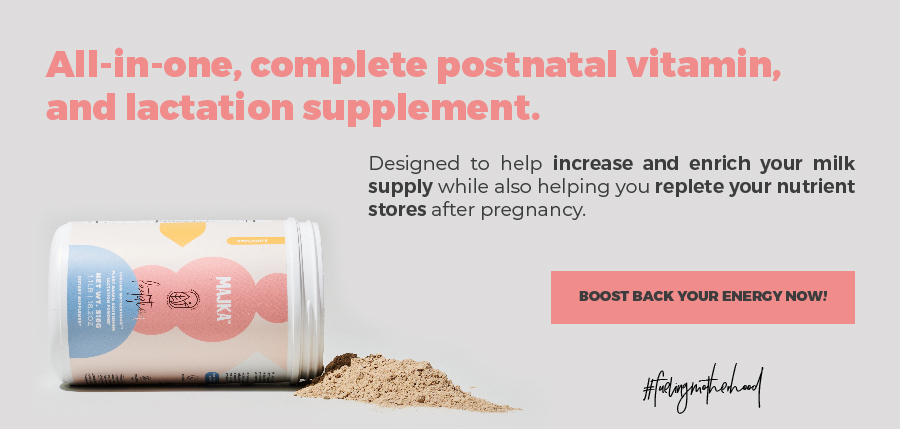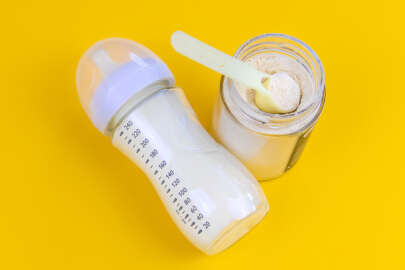
Every day all around the world, many moms are challenged during their breastfeeding journey, dealing with feeding sessions that are not as plentiful as they used to be, so know that you are not alone in this, and going through ups and downs is part of the process, and with the help of your family doctor or lactation consultant, you should be able to take actions to avoid a low milk supply at most times.
If you’re reading this article, you are probably questioning yourself already if there is something you can do in your daily routine to avoid having a low milk supply, and the simple answer we can give you is: yes. Although, some factors that can trigger supply drops are not always in your control, adjusting some habits can make a significant difference in helping you give your baby the nutrition they need to grow healthy and strong.
The first, and one of the most critical steps to consider, to boost your supply if you are dealing with a milk drop, is to identify potential troubling habits that could be causing such; to help you, we share some factors that could cause a low milk supply that could be adjusted to let you and your baby live a happier and healthier breastfeeding journey:
1. Alcohol & smoking
You maybe have heard the rumor that having a beer before nursing helps your baby have easier access to milk during breastfeeding by relaxing the milk ejection reflex, but this “relaxation” comes actually from the depressant effect of alcohol on the central nervous system, which blocks hormones like oxytocin and prolactin that play an essential role in milk production.
While an occasional beer or glass of wine won’t have a negative impact on your milk supply, in the long term, alcohol consumption will affect your milk quality and milk volume.
In addition to this, maternal smoking should be avoided—including e-cigarettes– and it is highly recommended to quit this habit, as some of the harmful chemicals can be passed through breast milk, with nicotine being one of them, which also lowers prolactin levels and causes low milk supply.
2. Spices in your diet
While some herbs are considered lactogenic foods and can be used as a natural way to increase the production of milk, some ingredients in your diet can also cause a low milk supply when consumed frequently or in big quantities. Keep an eye on these commonly used herbs that are known to decrease milk production:
- Sage
- Peppermint
- Oregano
- Parsley
- Spearmint
- Thyme
- Rosemary
Although there are no formal studies to measure the exact quantities you need to consume to see a negative effect on your supply, keep an eye if your milk production lessens when you eat foods containing these ingredients.
3. Medication choices
Some over-the-counter medicines are safe for you to take and do not mean a risk to your milk-generating capacity; to be sure, you can even search them on reliable sites to clear any doubts before taking medication. There’s also medicine that has proven to cause adverse effects and trigger a low milk supply, which include:
- Cold medicine containing pseudoephedrine
- Birth control pills with estrogen
- Diphenhydramine (commonly known as Benadryl)
If you have noticed a drop in your milk supply while on medication, check if you haven’t taken these and if you have, consult with your health care provider for alternative treatments.
4. Unfrequent breastfeeding
The number of times you breastfeed and the length of your feeding sessions play an important role in building a healthy milk supply, as your breasts will generate milk as your baby demands it by continuously removing their content.
When your baby is not feeding as consistently as they should– around 8 to 12 times at least for the first months– your breasts are going to be full with milk for longer periods of time, resulting in less milk creation. Having this in mind, consider that supplementing your baby’s diet without pumping, affects the stimulation of your breasts, and can result in a negative impact on your milk supply, added to the fact that breast milk has more benefits for them than formula.
After the first 4 weeks, avoid going through long periods without successful milk removals. Nights with feeding pauses from 4 to 5 hours can start to negatively impact your supply.
5. Letting stress take control
Probably one of the most important things we can advise is to not forget to take care of your mental health during your experience as a new mom. As much as we are sure this will be an adventure full of beautiful moments, between the lack of sleep and trying to stick to your new routine, stress, and anxiety are always around the corner.
Just because you are dealing with new responsibilities, it does not mean that you should be bearing all this weight on your own. We strongly encourage all mommies to seek the guidance of a mental health expert if signs of stress, anxiety, or postpartum depression start to show, as these factors could have a great impact on your ability to produce milk.
Consider getting a local support group, even if that is your partner and other family members helping with small chores like doing laundry and cooking, as it could make a massive difference in your mental state.
Remember, struggling with low milk supply could come your way at any given moment and that’s perfectly normal; you are not alone when it comes to your breastfeeding process, and a drop doesn’t mean you should be considering changing to formula nor that something is wrong with you, and with a little guidance from your family doctor or lactation consultant, you should be able to get a solution that fits you and your baby’s needs. Finally, we suggest you follow our content at Breastfeeding 101, where we share all the tips you will need during this journey as a new mommy.
Still curious about what could trigger a low milk supply? We encourage you to deepen into this topic with the resources that made this article possible:
4 factors that can decrease breast milk supply | UT Southwestern Medical Center
Understanding Over-the-Counter Medicines | FDA
Drugs and Lactation Database | NIH
Principles for Maintaining or Increasing Breast Milk Production | JOGNN
The Risks of Not Breastfeeding for Mothers and Infants | NIH
Annie Rueb






